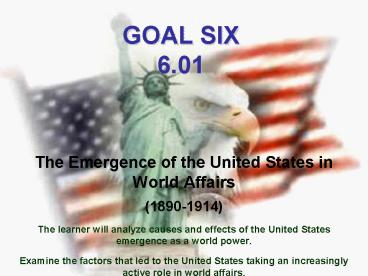GOAL SIX 6'01 - PowerPoint PPT Presentation
1 / 7
Title:
GOAL SIX 6'01
Description:
Mahan wrote The Influence of Sea Power upon History, 1660-1783 (1890), which had ... Hawaii, Guam, the Philippines, and Puerto Rico in the name of imperialism. ... – PowerPoint PPT presentation
Number of Views:40
Avg rating:3.0/5.0
Title: GOAL SIX 6'01
1
GOAL SIX6.01
- The Emergence of the United States in World
Affairs - (1890-1914)
- The learner will analyze causes and effects of
the United States emergence as a world power. - Examine the factors that led to the United States
taking an increasingly active role in world
affairs.
2
Alfred T. Mahan- (1840-1914)
- naval strategist and historian. Mahan graduated
from the U.S. Naval Academy in 1859 and served in
the Civil War. A prominent American historian who
emphasized the importance of sea power in war and
peace, he influenced the growth of the U.S. Navy
and promoted U.S. imperialism. Mahan wrote The
Influence of Sea Power upon History, 1660-1783
(1890), which had a strong impact on U.S. and
world naval strategy and foreign policy preceding
World War I.
3
Josiah Strong
- The Reverend Josiah Strong was Secretary of the
Congregational Home Missionary Society when he
was asked to revise a manual put out by the
Society on social questions. Instead Strong
expanded the material into a persuasive book,
which soon sold 170,000 copies and was translated
into several foreign languages. Strong was a man
of intense prejudices, which he did not hesitate
to expound in his book, and which extended to
immigrants, Catholics, alcohol, tobacco, large
cities, and political machines.
4
Josiah Strong
- He preached that in the future the "Anglo-Saxon
race," especially the American part of it, would
dominate the world. His was one of the first
voices, in a time preoccupied by concern with
national development and internal settlement,
that urged Americans to think of their future
international role and to develop their
potentialities as an imperial nation.
5
Frederick Jackson Turner(1861-1932)
- historian. Turner's influential paper "The
Significance of the Frontier in American History"
(1893) presented the theory that an abundance of
free land strengthened democratic beliefs and
national development in the United States. Turner
viewed the frontier as a process in constant
change, formed by the area's natural resources
and the heritage and beliefs of the people who
moved into it. He won the Pulitzer Prize for
history in 1933 for Significance of Sections in
American History (1932).
6
Imperialism
- the foreign policy of controlling another
country, usually by military means, or exploiting
it economically. During the late 1800s, with the
closing of the frontier, many Americans thought
expansion elsewhere would be an efficient way to
meet the continuing demands of the country's
industry. New lands and colonies, it was thought,
would strengthen its military power. By 1900 the
United States had acquired Hawaii, Guam, the
Philippines, and Puerto Rico in the name of
imperialism.
7
Spheres of influence
- A sphere of influence is a metaphorical region of
political influences surrounding a country. When
a country falls into another's "sphere of
influence" that country frequently becomes
subsidiary to the more powerful one, operating as
a satellite state or de facto colony.































